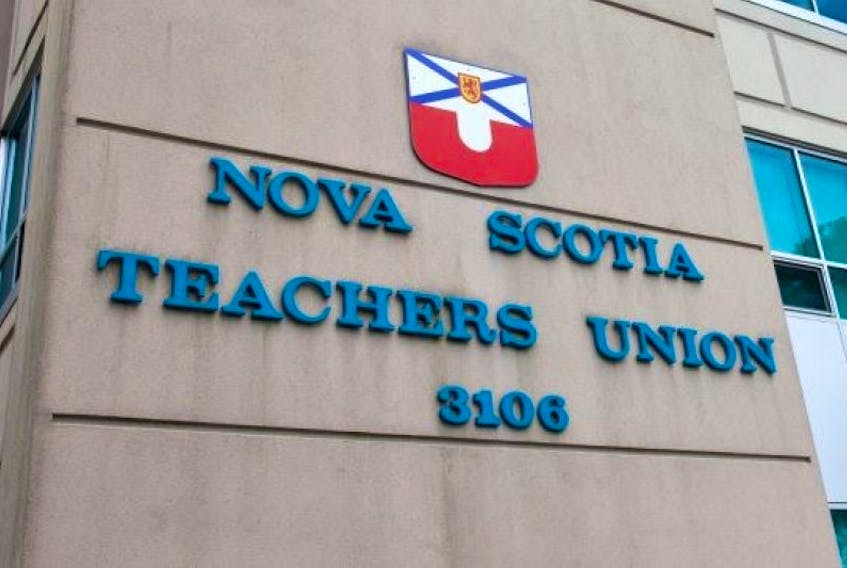As the Nova Scotia Teachers Union members held a provincewide strike vote Tuesday, labour unions representing thousands of education support workers, bus drivers, early childhood educators and more announced they are backing the NSTU in their battle with the province over the implementation of the recommendations of the Avis Glaze report.
The support comes on the same day members of the NSTU across the province are voting online on whether to give the union’s executive a strike mandate, even though any job action would be illegal. Results of the strike vote will not be released until after the NSTU provincial executive meets to discuss it on Wednesday.
While NSTU president Liette Doucet said the executive will also decide whether any job action takes place at all, she did say there are a wide range of options.
“There are any number of possibilities,” Doucet said. “We could do a rotating strike, we could do work to rule, we could do a full walkout, we could do a one-day walkout. There are a number of possibilities. It will all depend on the plan we look at (Wednesday).”
She said it’s possible the executive could make the decision on Wednesday to do some form of job action on Thursday but the union would take into account that parents would need advance notice.
“That’s part of the decision-making process that will come through our provincial executive, however, I can say that we are always concerned with student safety and we do believe that parents need some type of leeway in order to arrange for child care. I can’t tell you whether or not 48 hours notice will be given or not but I expect that some notice would be given so that parents can make arrangements that are necessary.”
Representatives of the Nova Scotia Federation of Labour, Canadian Union of Public Employees, Nova Scotia Government Employees Union and the Service Employees International Union Local 2 joined Doucet at a news conference on Tuesday to address the ongoing dispute.
Labour federation president Danny Cavanagh said the union leadership present — NSGEU president Jason MacLean, CUPE Nova Scotia president Nan MacFadgen, SEIU Local 2 secretary-treasurer Cathy Retieffe and Doucet — together represent about 17,000 members.
“This government restructuring is really much larger than teachers and administrative staff. It has implications for support staff in schools across Nova Scotia,” Cavanagh said. “Restructuring school boards will create greater instability in labour relations, relations already strained in the province. Any restructuring will just create massive disruption for thousands of union members who work on the front lines and for the system itself.”
Besides teachers and school administrators, those affected include educational assistants, teaching assistants, faculty operators, secretaries, school bus drivers, mechanics, caretakers, custodians, building specialists, janitors and maintenance workers, librarians and librarian assistants, cafeteria workers, community outreach workers, tradespeople, lunch and grounds supervisors, early childhood educators and other support positions in the board, he said.
“Our message today to the government is that the unions here are supporting the teachers in whatever they do, will consult with the teachers after they get their vote and go through their strike vote process and have their meeting tomorrow,” Cavanagh said. “And we’ll stand solid behind whatever the teachers want to do. But our message to the government is bring us to the table. Let us be part of this decision-making process because taking the legislative hammer, once again, to the unions of this province, doesn’t work, hasn’t worked and creates chaos in the system.”
Among the major concerns of the planned changes to the education system is the elimination of the province’s English-language school boards in favour of a provincial advisory council.
CUPE Nova Scotia’s McFadgen said there are contract negotiations under way with every school board in the province for the 4,000 members the union represents. There is even a tentative agreement with the Halifax Regional School Board that is waiting for ratification from the board, she said. Her members have ratified it but it’s meaningless until the HRSB does. But that is all in doubt.
“Even if we do bargain something, what weight does it have? Does it have weight? Maybe it does, maybe everything is fine. Maybe it’s not. We don’t know. Nobody will tell us,” McFadgen said in an interview before Tuesday’s news conference.
“It just totally throws the system into chaos, of which our members are a fundamental piece of that system.”
“Our members have direct relationships with school boards. School boards administer pensions and benefits in some of our school board areas and we have collective agreements that outline relationships between employer and employee with the employer being the school board. So, we’ve reached out to government and asked the questions, ‘what are the plans for this?’ And they’re not answering us. So the vacuum of information just leads people to fill that with anxiety, wondering what’s going to happen to them and how will this all roll out.”









